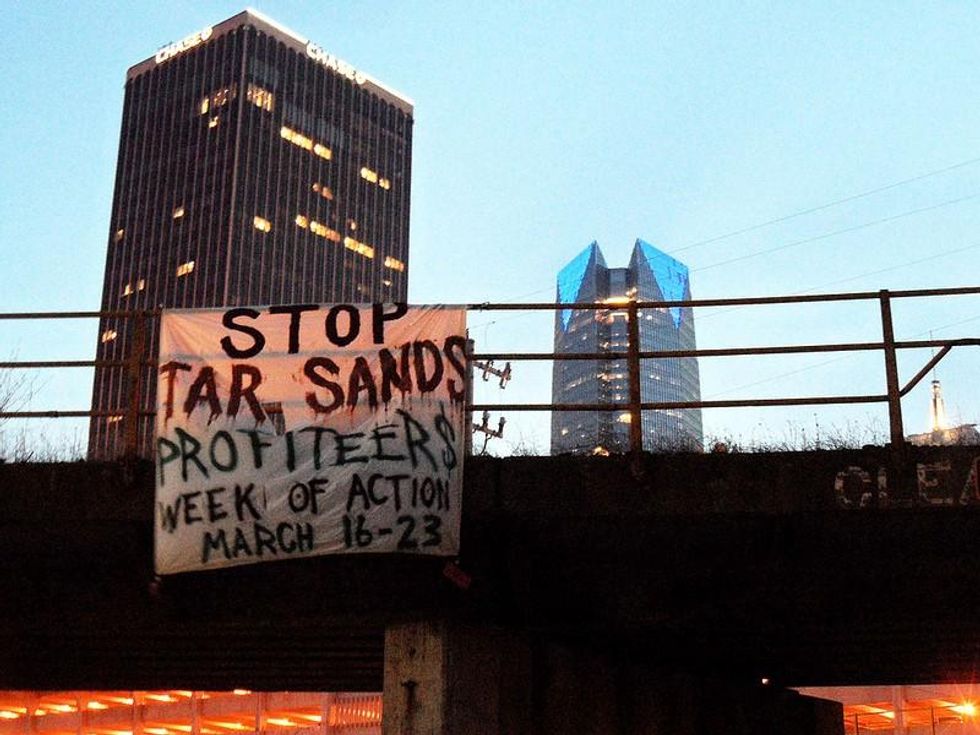

SUBSCRIBE TO OUR FREE NEWSLETTER
Daily news & progressive opinion—funded by the people, not the corporations—delivered straight to your inbox.
5
#000000
#FFFFFF
To donate by check, phone, or other method, see our More Ways to Give page.


Daily news & progressive opinion—funded by the people, not the corporations—delivered straight to your inbox.
Climate activists on both sides of the U.S. and Canadian border are ratcheting up the fight against the Keystone XL tar sands pipeline this week as the U.S. Senate ponders a recently proposed bill that would expedite its approval and "short-circuit" the State Department's pipeline environmental review.
In the past week over 30 protests have taken place in dozens of U.S. cities as part of a "March 16-23, Week of Action to Stop Tar Sands Profiteers," which has been coordinated by over 50 grassroots organizations.
So far, thirty-seven protesters have been arrested "for disrupting business as usual at TransCanada and their investors' offices," with more actions planned in the coming days.
"Organizers seek to expose green-washed corporations like TD Bank, a top shareholder in TransCanada, and force them to divest from the controversial Keystone XL tar sands pipeline," Tar Sands Blockade stated Wednesday.
"It's encouraging to see people around the country taking action to stop tar sands profiteers," said Ron Seifert, spokesperson for Tar Sands Blockade. "No longer will we allow them to build KXL and invest in toxic projects that endanger the health of low-income and communities of color. We will not allow 'business as usual' to continue."
From the Tar Sands Blockade, below are a few highlights from the week of action so far:
Meanwhile, native leaders from both Canada and the U.S. took to the Canadian Parliament on Wednesday to urge opposition to both the Northern Gateway and Keystone XL pipelines--telling lawmakers that an alliance of native groups on both sides of the border are preparing to fight the pipelines in the courts and through unspecified direct action in the coming months.
Chief Allan Adam of the Athabasca Chipewyan First Nation said natives are determined to block the pipelines.
"It's going to be a long, hot summer," he said at a news conference.
"We have a lot of issues at stake."
"We're going to stop these pipelines on way or another," said Phil Lane Jr. of the American Yankton Sioux.
"If we have to keep going to court, we'll keep doing that," said Chief Martin Louie of the Nadleh Whut'en First Nation in northern B.C., adding that pipeline opponents will never back down.
"We're the ones that's going to save whatever we have left of this Earth," he said.
"We, as a nation, have to wake up," said Chief Reuben George of the Tsleil-Waututh First Nation north of Vancouver. "We have to wake up to the crazy decisions that this government's making to change the world in a negative way."
More actions are expected throughout the U.S. in the coming days including six more actions against TD Bank in New York City, Washington D.C., Montpellier, Vt., Newark, Del., New Haven, Conn., and Asheville, N.C., Tar Sands Blockade reports.
On Thursday, March 21 in Oklahoma, the Great Plains Tar Sands Resistance is planning what is slated to be the largest action of the week. Activists have pledged to "physically stop KXL construction."
Click here for a full list of actions and live updates from around the country.


Dear Common Dreams reader, The U.S. is on a fast track to authoritarianism like nothing I've ever seen. Meanwhile, corporate news outlets are utterly capitulating to Trump, twisting their coverage to avoid drawing his ire while lining up to stuff cash in his pockets. That's why I believe that Common Dreams is doing the best and most consequential reporting that we've ever done. Our small but mighty team is a progressive reporting powerhouse, covering the news every day that the corporate media never will. Our mission has always been simple: To inform. To inspire. And to ignite change for the common good. Now here's the key piece that I want all our readers to understand: None of this would be possible without your financial support. That's not just some fundraising cliche. It's the absolute and literal truth. We don't accept corporate advertising and never will. We don't have a paywall because we don't think people should be blocked from critical news based on their ability to pay. Everything we do is funded by the donations of readers like you. Will you donate now to help power the nonprofit, independent reporting of Common Dreams? Thank you for being a vital member of our community. Together, we can keep independent journalism alive when it’s needed most. - Craig Brown, Co-founder |
Jacob Chamberlain is a former staff writer for Common Dreams. He is the author of Migrant Justice in the Age of Removal. His website is www.jacobpchamberlain.com.
Climate activists on both sides of the U.S. and Canadian border are ratcheting up the fight against the Keystone XL tar sands pipeline this week as the U.S. Senate ponders a recently proposed bill that would expedite its approval and "short-circuit" the State Department's pipeline environmental review.
In the past week over 30 protests have taken place in dozens of U.S. cities as part of a "March 16-23, Week of Action to Stop Tar Sands Profiteers," which has been coordinated by over 50 grassroots organizations.
So far, thirty-seven protesters have been arrested "for disrupting business as usual at TransCanada and their investors' offices," with more actions planned in the coming days.
"Organizers seek to expose green-washed corporations like TD Bank, a top shareholder in TransCanada, and force them to divest from the controversial Keystone XL tar sands pipeline," Tar Sands Blockade stated Wednesday.
"It's encouraging to see people around the country taking action to stop tar sands profiteers," said Ron Seifert, spokesperson for Tar Sands Blockade. "No longer will we allow them to build KXL and invest in toxic projects that endanger the health of low-income and communities of color. We will not allow 'business as usual' to continue."
From the Tar Sands Blockade, below are a few highlights from the week of action so far:
Meanwhile, native leaders from both Canada and the U.S. took to the Canadian Parliament on Wednesday to urge opposition to both the Northern Gateway and Keystone XL pipelines--telling lawmakers that an alliance of native groups on both sides of the border are preparing to fight the pipelines in the courts and through unspecified direct action in the coming months.
Chief Allan Adam of the Athabasca Chipewyan First Nation said natives are determined to block the pipelines.
"It's going to be a long, hot summer," he said at a news conference.
"We have a lot of issues at stake."
"We're going to stop these pipelines on way or another," said Phil Lane Jr. of the American Yankton Sioux.
"If we have to keep going to court, we'll keep doing that," said Chief Martin Louie of the Nadleh Whut'en First Nation in northern B.C., adding that pipeline opponents will never back down.
"We're the ones that's going to save whatever we have left of this Earth," he said.
"We, as a nation, have to wake up," said Chief Reuben George of the Tsleil-Waututh First Nation north of Vancouver. "We have to wake up to the crazy decisions that this government's making to change the world in a negative way."
More actions are expected throughout the U.S. in the coming days including six more actions against TD Bank in New York City, Washington D.C., Montpellier, Vt., Newark, Del., New Haven, Conn., and Asheville, N.C., Tar Sands Blockade reports.
On Thursday, March 21 in Oklahoma, the Great Plains Tar Sands Resistance is planning what is slated to be the largest action of the week. Activists have pledged to "physically stop KXL construction."
Click here for a full list of actions and live updates from around the country.


Jacob Chamberlain is a former staff writer for Common Dreams. He is the author of Migrant Justice in the Age of Removal. His website is www.jacobpchamberlain.com.
Climate activists on both sides of the U.S. and Canadian border are ratcheting up the fight against the Keystone XL tar sands pipeline this week as the U.S. Senate ponders a recently proposed bill that would expedite its approval and "short-circuit" the State Department's pipeline environmental review.
In the past week over 30 protests have taken place in dozens of U.S. cities as part of a "March 16-23, Week of Action to Stop Tar Sands Profiteers," which has been coordinated by over 50 grassroots organizations.
So far, thirty-seven protesters have been arrested "for disrupting business as usual at TransCanada and their investors' offices," with more actions planned in the coming days.
"Organizers seek to expose green-washed corporations like TD Bank, a top shareholder in TransCanada, and force them to divest from the controversial Keystone XL tar sands pipeline," Tar Sands Blockade stated Wednesday.
"It's encouraging to see people around the country taking action to stop tar sands profiteers," said Ron Seifert, spokesperson for Tar Sands Blockade. "No longer will we allow them to build KXL and invest in toxic projects that endanger the health of low-income and communities of color. We will not allow 'business as usual' to continue."
From the Tar Sands Blockade, below are a few highlights from the week of action so far:
Meanwhile, native leaders from both Canada and the U.S. took to the Canadian Parliament on Wednesday to urge opposition to both the Northern Gateway and Keystone XL pipelines--telling lawmakers that an alliance of native groups on both sides of the border are preparing to fight the pipelines in the courts and through unspecified direct action in the coming months.
Chief Allan Adam of the Athabasca Chipewyan First Nation said natives are determined to block the pipelines.
"It's going to be a long, hot summer," he said at a news conference.
"We have a lot of issues at stake."
"We're going to stop these pipelines on way or another," said Phil Lane Jr. of the American Yankton Sioux.
"If we have to keep going to court, we'll keep doing that," said Chief Martin Louie of the Nadleh Whut'en First Nation in northern B.C., adding that pipeline opponents will never back down.
"We're the ones that's going to save whatever we have left of this Earth," he said.
"We, as a nation, have to wake up," said Chief Reuben George of the Tsleil-Waututh First Nation north of Vancouver. "We have to wake up to the crazy decisions that this government's making to change the world in a negative way."
More actions are expected throughout the U.S. in the coming days including six more actions against TD Bank in New York City, Washington D.C., Montpellier, Vt., Newark, Del., New Haven, Conn., and Asheville, N.C., Tar Sands Blockade reports.
On Thursday, March 21 in Oklahoma, the Great Plains Tar Sands Resistance is planning what is slated to be the largest action of the week. Activists have pledged to "physically stop KXL construction."
Click here for a full list of actions and live updates from around the country.

